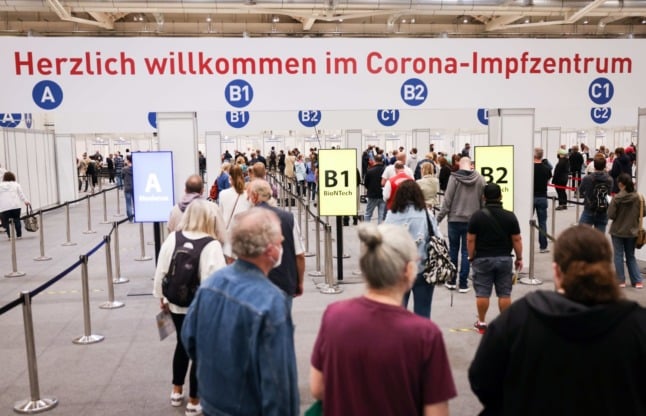German employers and unions call for more workers to get vaccinated
Around 64 percent of the population has received at least one Covid jab in Germany, and 59.4 percent are fully vaccinated – but the vaccine campaign has stalled in recent weeks.
Now employer and employee representatives are joining in the calls of politicians, urging more people to get their shots.
“We must be careful not to gamble away what we have achieved,” said a joint appeal by employers’ president Rainer Dulger and the chairman of the Confederation of German Trade Unions, Reiner Hoffmann on Monday.
“We cannot and must not be satisfied with the current vaccination rate.”
READ ALSO: Fourth wave – What we know about Germany’s spike in Covid cases
Every vaccinated person helps fight the spread of Covid-19 and the return to more normality in private and working life, the statement added.
Millions of workers have been vaccinated in recent weeks – many by company doctors.
“In total, more than five million vaccination doses have gone to company doctors,” Dulger and Hoffmann said. “This has helped ramp up the vaccination campaign and reach even more people.”
The two top officials expressed concern about the flattening of vaccination momentum. “More aggressive viral variants in particular are causing incidence numbers to rise again,” they said.
They urged employers to do as much as possible to keep workplaces safe.
“We therefore appeal once again as social partners together to all employers and employees in Germany: continue to be prudent and responsible,” Dulger and Hoffmann said.
“Continue to play your part in protecting people in workplaces.”
Employers should offer workplace vaccinations and testing wherever possible, they said.
“At the same time, we appeal to workers to take up the vaccination and testing offers to help ensure high vaccination coverage and protection levels.”
Workers in Hamburg face new rules
The Hamburg government is giving business owners and venues the option of allowing entry to only the vaccinated and people who’ve recovered from Covid – excluding unvaccinated people.
Businesses or events that offer this so-called 2G entry system (rather than the 3G system which allows for unvaccinated people to show proof of a negative Covid test for entry) will also have to require staff to follow the rules.
That means they must either be vaccinated against Covid or have recovered from the virus in the last six months for 2G events.
“The obligation to provide proof also applies to employees working on the premises who are on the same premises as customers,” said the Hamburg Senate in a press release when announcing the plans.
This will have huge implications for people living in the city – as well as employers and employees.
READ MORE: 3G to 2G – Hamburg venues can allow entry for Covid-vaccinated people only
Businesses can bring in these rules from Saturday, but they have to let the city know if they are using a 2G entry system.
Organisers and owners have to control entry to the events or venues. Violations could result in fines of between €1,000 and €20,000.
We’re yet to see if other German states will follow this model.
Germany moves into modern times
For a long time, cash has been king in Germany for consumers and businesses alike. But the pandemic has changed that, a new survey suggests.
In a survey for the German organisation Euro Kartensysteme, 47 percent of 1,200 consumers surveyed in June said they preferred to pay at the checkout with their debit card. A total of 45 percent said they preferred using notes and coins, 13 percent liked using credit cards and 10 percent used other means of payment.

Just under half of consumers in the survey said that cash is much less important to them today than 10 years ago, because there are now plenty of other payment methods. One in three (33 percent) said they carry less cash today than 10 years ago. For 49 percent, the amount of cash they carry remains largely the same.
The trend toward cashless payment has received a boost during the pandemic because people consider it more hygienic to handle plastic cards than bills and coins.
According to Euro Kartensysteme, around 2.71 billion transactions were made in Germany with debit cards alone in the first half of 2021: 4.7 percent more than in the same period last year. Turnover amounted to around €114 billion. Between 2016 and 2020, the number of payment transactions using the giro card (former EC card) almost doubled, it said.
Germany more than €80 billion in the red
The Covid pandemic has taken its toll on Germany’s finances.
The federal, state and local governments – as well as the social security system – will have to spend €80.9 billion more than they take in – and that’s just in the first half of 2021, according to the Federal Statistical Office.
It is one of the largest deficits since German reunification, German daily Bild reported.
“The measures to combat the coronavirus pandemic continue to weigh heavily on government finances,” said Stefan Hauf of the statistics office. “They have led to the second-highest deficit in a first half of the year since German reunification in 1991.”
Germany has spent bucketloads of cash in propping up the economy during the pandemic, including on the Kurzarbeit (reduced working hours) scheme and support for closed shops, restaurants and other businesses. Covid testing and vaccinations have also been costly.
All state balances were in the red. The largest minus was the federal government with a deficit of €67 billion. The social security system posted a deficit of €10.2 billion, while the deficit at state (€3.1 billion) and local government (€0.6 billion) was comparatively small.
However, the German economy is growing again, slowly.
After the slump in the Covid shutdown, GDP rose by 1.6 percent from April to June compared to the previous quarter. That’s largely due to consumers’ appetite for spending after the gradual easing of the Covid measures, but government spending also boosted the economy.
Is this article useful?
Please get in touch with us at [email protected] to let us know if this weekly feature is useful and any suggestions you have for articles on The Local Germany.



 Please whitelist us to continue reading.
Please whitelist us to continue reading.
Member comments